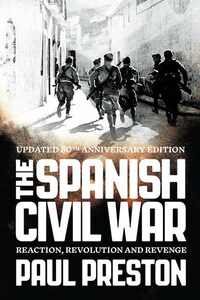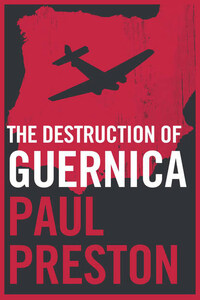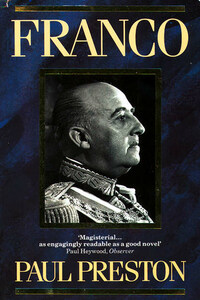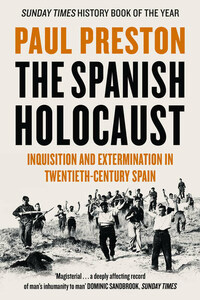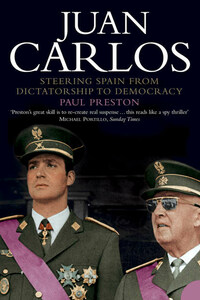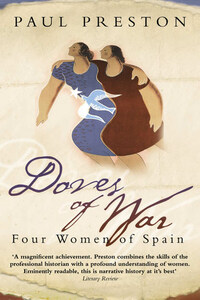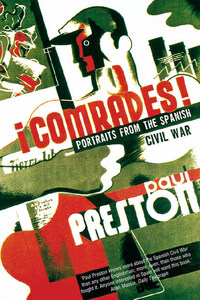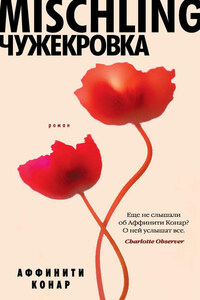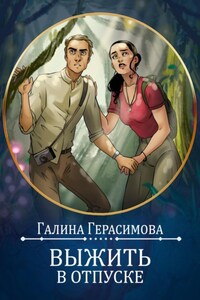William Collins
An imprint of HarperCollinsPublishers
1 London Bridge Street
London SE1 9GF
www.WilliamCollinsBooks.com
First published in Great Britain by Harper Perennial in 2006
This book is a revised and updated version of A Concise History of the Spanish Civil War, first published by Fontana Press in 1996, revised and updated from The Spanish Civil War 1936â1939, first published by Weidenfeld & Nicolson in 1986
First published in Great Britain by William Collins 2016
Copyright © Paul Preston 1986, 1996, 2006, 2016
Paul Preston asserts the moral right to be identified as the author of this work
A catalogue record for this book is available from the British Library
Cover photograph © Keystone/Getty Images
Map © Hardlines
All rights reserved under International and Pan-American Copyright Conventions. By payment of the required fees, you have been granted the non-exclusive, non-transferable right to access and read the text of this e-book on screen. No part of this text may be reproduced, transmitted, down-loaded, decompiled, reverse engineered, or stored in or introduced into any information storage and retrieval system, in any form or by any means, whether electronic or mechanical, now known or hereinafter invented, without the express written permission of HarperCollins.
Source ISBN: 9780007232079
Ebook Edition © July 2012 ISBN: 9780007370061
Version: 2017-05-04
This book is dedicated to the memory of David Marshall and to the other men and women of the International Brigades who fought and died fighting fascism in Spain.
I wrote the first version of this book thirty years ago. My intention then was to provide the new reader with a manageable guide to the bibliographical labyrinth constituted by the fact that the Spanish Civil War has continued to be fought on paper. Even then there had been several thousand books on the Spanish Civil War and many of them were extremely long. Because the flow did not stop, I rewrote the book in 1996 in order to take account of what had been published in the ten years following its first appearance. At that point, I could not have imagined how much more was still to come. Accordingly, in 2006 I wrote a much expanded version in an attempt to come to terms with the very considerable body of scholarship which has been published in Spanish, Catalan, English and other European languages since 1996. It also drew on my own ongoing research on Franco, the Francoist repression and Mussoliniâs role in the Spanish Civil War. Over the following years, the flood has not abated, and in this new edition I take account of the most important advances in knowledge about the war as well as drawing on my recent research on the role of Franco, on the murders of civilians behind the lines on both sides, on anti-clerical persecution, on the bombing of Guernica, and on way in which the war ended.
Inevitably, the 2006 edition of the book was much longer â the text 50 per cent longer â than in 1996, and this one adds further material in the light of recent research. Like the three earlier versions, it is interpretative rather than descriptive although even more ample use has been made of contemporary quotation to give a flavour of the period. It remains a book that does not set out to find a perfect balance between both sides. I lived for several years under Francoâs dictatorship. It was impossible not to be aware of the repression of workers and students, the censorship and the prisons. As late as 1975 political prisoners were still being executed. Despite what Franco supporters claim, I do not believe that Spain derived any benefit from the military rising of 1936 and the Nationalist victory of 1939. Many years devoted to the study of Spain of before, during and after the 1930s have convinced me that, while many mistakes were made, the Spanish Republic was an attempt to provide a better way of life for the humbler members of a repressive society. Against such temerity, the revenge taken by Franco and his followers was brutal and pitiless. Accordingly, there is little sympathy here for the Spanish right, but I hope there is some understanding.
My early interest in Spain was stimulated by the postgraduate seminar run at the University of Reading by Hugh Thomas and by JoaquÃn Romero Maura in Oxford. Over many years, I learned an enormous amount during my friendship with Herbert Southworth who was always prodigal with his hospitality and his knowledge. When I wrote the 1996 version, I was aware of how much I had derived from conversations over many years with Raymond Carr, Norman Cooper, Denis Smyth, Angel Viñas, Julián Casanova, Jerónimo Gonzalo and Martin Blinkhorn. Throughout the 1990s, the historiography of the Spanish Civil War was profoundly changed by the research of Ãngela Cenarro, Helen Graham, Gerald Howson, Enrique Moradiellos, Alberto Reig Tapia, Francisco Espinosa Maestre and Ismael Saz. I continue to gain greatly from reading their work and many hours of conversation with them.
